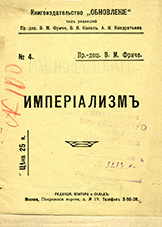

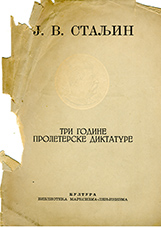
Speech of Stalin at a session of the Baku Soviet on November 6, 1920: Published in Yugoslavia under the label of "КVЛТУРА. БИБЛИОТЕК МАРКСИЗМА-ЛЕЊИНИЗМА" in the year 1946
More...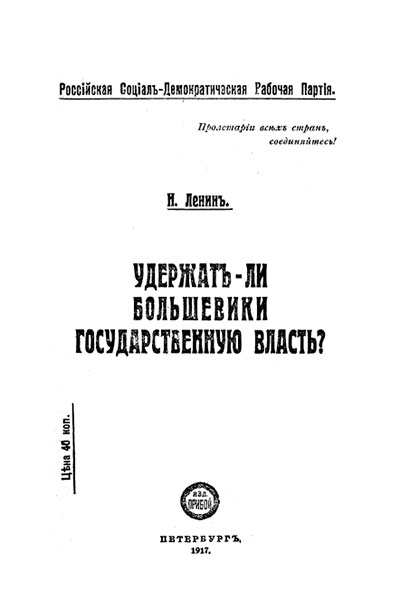
Keywords: revolution; power; the Bolsheviks
The present pamphlet, as is evident from the text, was written at the end of September and was finished on October 1, 1917. The October 25 Revolution has transferred the question raised in this pamphlet from the sphere of theory to the sphere of practice. This question must now be answered by deeds, not words. The theoretical arguments advanced against the Bolsheviks taking power were feeble in the extreme. These arguments have been shot to pieces. The task now is for the advanced class—the proletariat— to prove in practice the viability of the workers' and peasants' government. All class-conscious workers, all the active and honest peasants, all working and exploited people, will do everything they can to solve the immense historic question in practice. // To work, everybody to work, the cause of the world socialist revolution must and will triumph. (from the preface written by Lenin, St. Petersburg, November 9, 1917.)
More...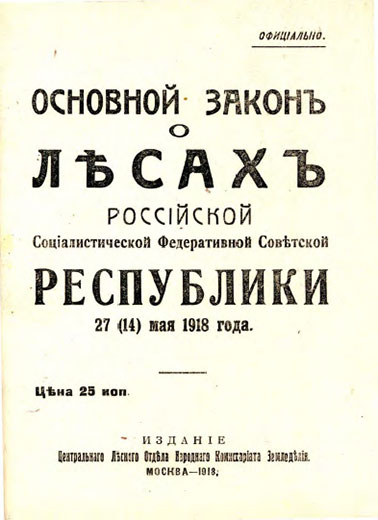
Keywords: Revolution; nationalization; law
More...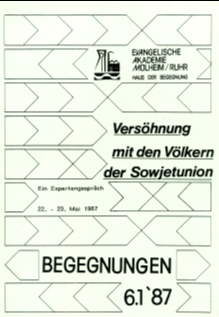
Keywords: facing the past, memorizing history;
contributions to a conference held on 22nd and 23rd of June 1987 in the Academy of the Protestant Church in Mülheim/Ruhr. The paper has been published by the Academy under the ISBN 3-926188-02-2 Main contributions by: Dieter Bach, Karl-Heinz Ruffmann, Günther von Norden, Alexander Fischer, Hans-Adolf Jacobsen, Herbert Straeten
More...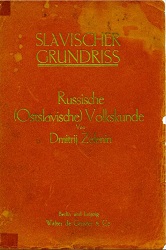
This is the digitized copy of the book published in 1927 as one volume of the "Grundriss der slavischen Philologie und Kulturgeschichte", edited by Reinhold Trautmann and Max Vasmer in the publishing house "Walter de Gruyter & Co". For Detailed information regarding the content, please download the Table of Content from the "Contents"-Tab here below.
More...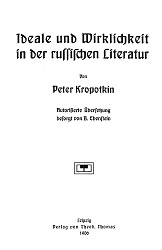
Keywords: Russian Literautre;
PLEASE DOWNLOAD THE INTRODUCTION-PDF-FILE BEFORE BUYING THIS BOOK TO EVALUATE WHETHER OR NOT THE SPECIAL OLD GERMAN CHARACTER STYLE IS READABLE FOR YOU. // „Since it would have been impossible to cover a subject as big as Russian Literature in one book, I turned my main attention to modern literature. The earlier writers up to Pushkin and Gogol - the founders of modern literature - are treated in a short sketch; then I move on to the chief masters of poetry, novella, drama, political literature, and criticism, and around these I have grouped the less excellent writers, the majority of whom are dealt with in brief notes. I am well aware that each of these latter offers something of his own and would be worth being explored in more detail. I also know that some of the lesser-known authors have occasionally portrayed certain schools of thought better than their more famous colleagues. But in a book intended only to give a broad general idea of the subject, the approach I chose was commanded.” (from the author’s introduction 1906)
More...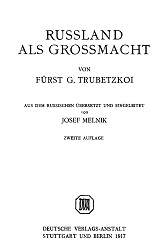
Keywords: Panslavism; Russia and the Balkans;
PUBLISHED BY DEUTSCHE VERLAGS-ANSTALT STUTTGART UND BERLIN, 1917. „The present study on the state of international politics and the tasks assigned to Russia in connection with it was written in the autumn of 1910 - at a time when the author took a break in his diplomatic service, worked for some time as a journalist, and then accepted his appointment in the Ministry of Foreign Affairs. In a small space, the author has succeeded in providing a clear and descriptive analysis of the global political crystallizations since their appearance of. Bismarck up to the events of 1910. All major political shifts in international peoples' life, the roots of today's grouping of powers, are here uncovered by a careful and knowledgeable hand. Some judgments, namely those about the way things are going in the Balkans, have been somewhat outdated by recent events, but have not been entirely eliminated. The fact that the author does not ascribe that exaggerated and completely wrong meaning to Pan-Slavism, as often happened in Germany until recently and is basically still happening now, is proof not only of his sharp eyes, but also of his clean disposition. Basically, Pan-Slavism in the hands of the Russian reaction was just as feeble but popular as a political tool as Pan-Islamism was in the limp hands of Abd ul Hamid. After the last Balkan Wars, Russia's prestige has only lost its effect on the Balkan Slavs.” (from the translator's introduction in 1917)
More...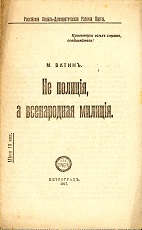
Keywords: police in pre-revolutionary Russia;
Published by the Russian Social-Democratic Workers‘ Party (Россійская Соціалъ-Демократичзская Рабочая Партія) in 1917 in St.Petersburg.
More...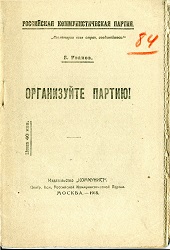
Published by the publishing house „COMMUNIST“ (Издательство „КОММУНИСТ") in 1918 in Moscow.
More...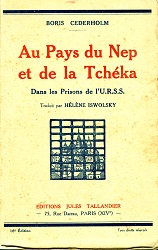
Keywords: Cheka; All-Russian Extraordinary Commission; Всеросси́йская чрезвыча́йная коми́ссия; Solovki prison camp;
From 1924 to 1926, the Soviet government, or more precisely the Cheka, detained me, a foreigner, not guilty of any crime, in various places of detention, and finally deported me to the concentration camp. of Solovetzk for a period of three years, without prior judgment and in force by a simple decision of the Gué-Pé-Ou, in other words the Cheka. // My experiences in Soviet Russia are so implausible, because of the cruelty and cynicism shown towards me, that I have found it useful to add to this book the copy of certain documents extracted correspondence concerning my "case" and exchanged between the Consulate of Finland and the Public Commissariat of Foreign Affairs. Unfortunately, I am currently unable to publish in full the many documents relating to the talks between the Finnish government and the Soviet government regarding my arrest and release. But the few pieces that I have found opportune to publish amply confirm the veracity of my account. I would like to draw the reader's attention to the fact that in the course of the following account I have changed the surnames of the people I have mentioned, as well as certain circumstances, but only in cases where I do so. I deemed it necessary for the safety of these people, who are still alive and who are in a territory where they would risk being reached by the Gué-Pé-Ou, in other words the Tcheka. (from Author’s introduction) - DIGITIZED COPY OF THE 1928 EDITION OF «EDITIONS JULES TALLANDIER», Paris
More...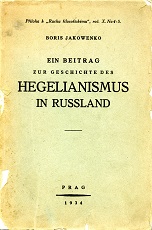
Keywords: Hegelianism in Russia;
Published in Prague in 1934, the year X of the serial «Přiloha k „Ruchu filosofickému" (The Russian Thought), roč. X. No 4-5.».
More...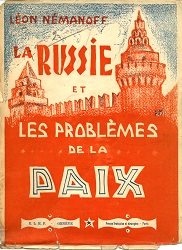
Keywords: Russia 1945: Soviet imperialism;
Napoleon said that a country’s foreign policy is determined by its geographical position and its permanent interests. German geopoliticians, led by Haushofer, did not contradict him. If, in our capacity as human geographer, we find the direct relation of the natural environment to politics too summary, by a method capable of sometimes misleading uncritical minds or even of justifying abominable acts, on the other hand, we are ready to follow Léon Némanoff in a similar demonstration, but which does not ignore the human factor and economic influences. // The author of “Russia and the Problems of Peace” is a specialist in Slavic issues, as we had noticed in the heyday of the S. d. N. His training meets scientific requirements. He even manages to remain objective, in dealing with his own country. This is not to say, however, that he will not let his patriotism pierce his words. And M. Némanoff will take us on an astonishing adventure, that of the Russian people. He will make us relive it as he feels it, intensely. Departing with him from the constants of Russian politics, we will watch a historical film which will now unfold logically, the characters of this poignant drama obeying in a way an irresistible imperative.
More...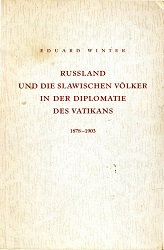
Keywords: Vatican and Slavic World; Vatican in Cold War;
It is stimulating and important to study carefully the position of the Vatican in relation to the world powers at the time when the decisive concentration of economic and political forces, which led directly to the First World War, took place. Especially today, when the Catholic Church is once again coming to the fore as the “bulwark of the West” against the “East”, it is of interest to look at this point of curial politics, which has been particularly sensitive for centuries, in consideration of Russia and the Slavic peoples to study the interweaving of religion and politics of Vatican diplomacy. // That is why the present treatise is not only an important chapter in church history, as it may seem at first, but it is much more an eminently political topic. It is politics in the truest sense of the word, which intervenes very deeply in world events or at least wants to intervene. Often the religious takes a back seat in the book to such an extent that the reader completely forgets that he is dealing with church and religion. Politics and the church, which is equated with religion, are so indissolubly linked. (from the author's introduction)
More...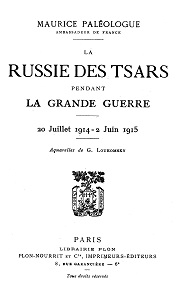
Keywords: World War I;
A diplomatic Diary written by M. Palélogue during his tenure of office as French Ambassador in St. Petersburg, published in France after the end of WW I //Paris, Librarie Plon 1921 by Plon-Nourrit et Cie.
More...
Keywords: World War I;
A diplomatic Diary written by M. Palélogue during his tenure of office as French Ambassador in St. Petersburg, published in France after the end of WW I // Paris, Librarie Plon 1922 by Plon-Nourrit et Cie.
More...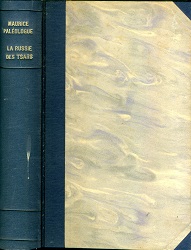
A diplomatic Diary written by M. Palélogue during his tenure of office as French Ambassador in St. Petersburg, published in France after the end of WW I // Paris, Librarie Plon 1922 by Plon-Nourrit et Cie.
More...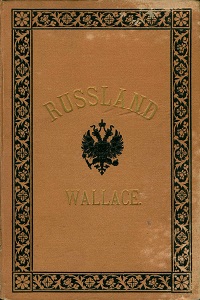
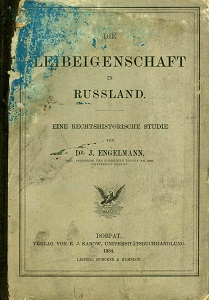
Keywords: serfdom: Russia;
Published in 1884 by Duncker & Humblot Publishing House in Leipzig, // Editorial remark by the Author: „This study was already published in the years 1880 and 1881 in the Baltic Monthly (vols. XXVII and XXVIII) under the title “The emergence and abolition of serfdom in Russia”. The work now appears with references to sources and has been supplemented and completed throughout and can therefore be viewed as an improved and enlarged edition. The first pages have been completely reworked based on new research; otherwise the opinion has remained unchanged. Larger additions relate to the property situation in the north of Russia after the collapse of Novgorod independence, to the position of the code of 1649 and the so-called Great Commission of Catherine II on serfdom. Newly added is Chapter IX.
More...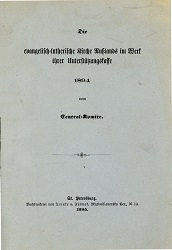
Keywords: protestant church in Russian Baltics;
ORIGINAL PREINTED IN GERMAN FRACTURA FONT: PLEASE MAKE SURE YOU’LL BE ABLE TO READ (see Introduction.pdf) Published in 1895 by the Central Committee of the Russian Lutheran Church // From the introduction: In the last two years, it is primarily the Estonian and Livonian parish Augmentaioln Funds that have been incorporated into our administration - because they serve similar purposes to our Support Fund. In Reval, two foundations with special provisions were also handed over to the district committee. All in all, this amounts to more than 100,000 rubles, by which the annual bill is now larger. This deceives the eyes of the uninitiated and they will draw false conclusions. It is in keeping with the spirit of the Gospel not to collect treasures or accumulate capital; for we should not place our trust in money, but in the spirit as the true comforter. Hence, the Central Committee doesn’t set out to accumulate treasure. But where it receives foundations for the benefit of the church, it has no right to carry them out in any other way than the founders have ordered in their friendly disposition.
More...